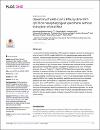Detection of SARS-CoV-2 RNA by direct RT-qPCR on nasopharyngeal specimens without extraction of viral RNA.

View/
Date
2020-07-24Author
Hasan, Mohammad RubayetMirza, Faheem
Al-Hail, Hamad
Sundararaju, Sathyavathi
Xaba, Thabisile
Iqbal, Muhammad
Alhussain, Hashim
Yassine, Hadi Mohamad
Perez-Lopez, Andres
Tang, Patrick
...show more authors ...show less authors
Metadata
Show full item recordAbstract
To circumvent the limited availability of RNA extraction reagents, we aimed to develop a protocol for direct RT-qPCR to detect SARS-CoV-2 in nasopharyngeal swabs without RNA extraction. Nasopharyngeal specimens positive for SARS-CoV-2 and other coronaviruses collected in universal viral transport (UVT) medium were pre-processed by several commercial and laboratory-developed methods and tested by RT-qPCR assays without RNA extraction using different RT-qPCR master mixes. The results were compared to that of standard approach that involves RNA extraction. Incubation of specimens at 65°C for 10 minutes along with the use of TaqPath™ 1-Step RT-qPCR Master Mix provides higher analytical sensitivity for detection of SARS-CoV-2 RNA than many other conditions tested. The optimized direct RT-qPCR approach demonstrated a limit of detection of 6.6x103 copy/ml and high reproducibility (co-efficient of variation = 1.2%). In 132 nasopharyngeal specimens submitted for SARS-CoV-2 testing, the sensitivity, specificity and accuracy of our optimized approach were 95%, 99% and 98.5%, respectively, with reference to the standard approach. Also, the RT-qPCR CT values obtained by the two methods were positively correlated (Pearson correlation coefficient r = 0.6971, p = 0.0013). The rate of PCR inhibition by the direct approach was 8% compared to 9% by the standard approach. Our simple approach to detect SARS-CoV-2 RNA by direct RT-qPCR may help laboratories continue testing for the virus despite reagent shortages or expand their testing capacity in resource limited settings.
Collections
- Biomedical Research Center Research [786 items ]
- COVID-19 Research [848 items ]

